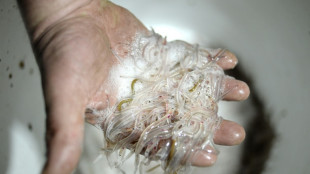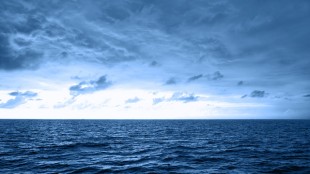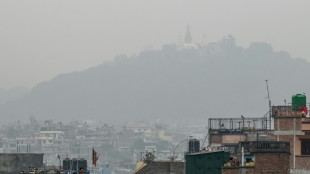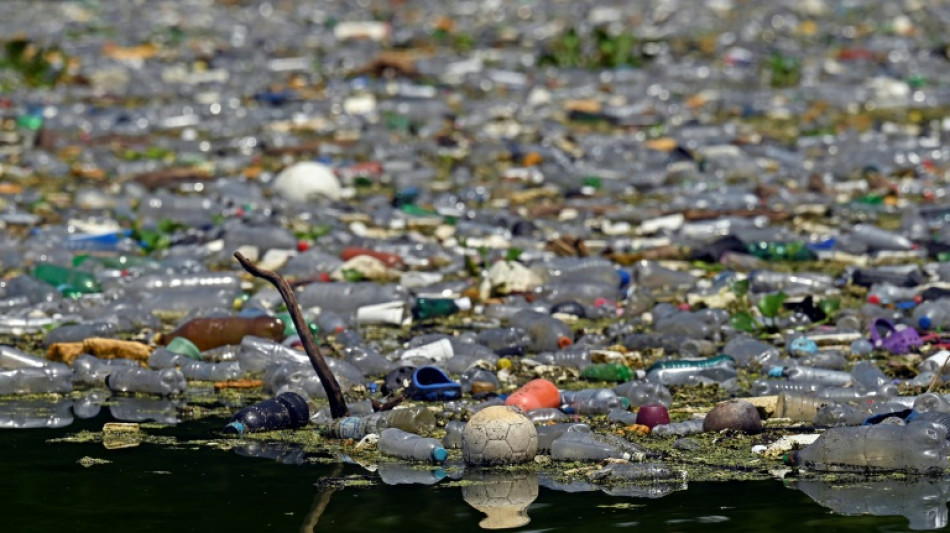
-
 Digital divas: Can Japan's virtual YouTuber craze crack America?
Digital divas: Can Japan's virtual YouTuber craze crack America?
-
WHO pandemic agreement talks face deadline crunch
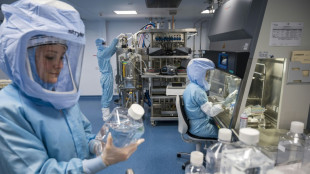
-
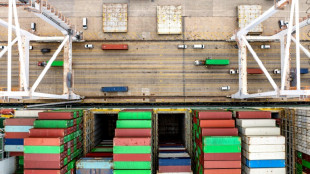 Stocks, dollar sink and gold hits record as Trump tariff panic returns
Stocks, dollar sink and gold hits record as Trump tariff panic returns
-
LeMond hails 'one in a million' Pogacar ahead of Paris-Roubaix debut

-
 Liverpool can move closer to the title as top five tension mounts
Liverpool can move closer to the title as top five tension mounts
-
Trump admits trade war 'cost' as markets hit

-
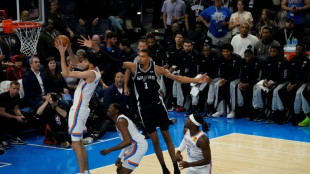 AI only just beginning to revolutionize the NBA game
AI only just beginning to revolutionize the NBA game
-
Despite Trump pause, overall US tariff rate at highest in a century

-
 'A pain that doesn't subside' at funerals for Dominican nightclub disaster victims
'A pain that doesn't subside' at funerals for Dominican nightclub disaster victims
-
Panama deal allows US to deploy troops to canal
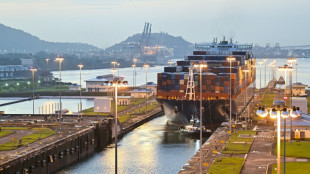
-
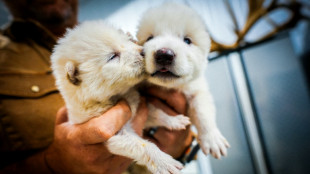 US firm says it brought back extinct dire wolves
US firm says it brought back extinct dire wolves
-
Grieving Dominicans start burying 220 victims of nightclub disaster
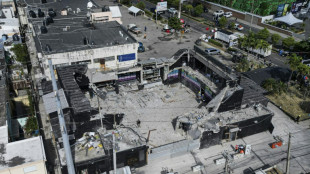
-
 Aberg closes strong at 'sneaky hard' Augusta National
Aberg closes strong at 'sneaky hard' Augusta National
-
US auto union praises some Trump tariffs

-
 Australian IVF clinic admits embryo mix-up
Australian IVF clinic admits embryo mix-up
-
Rose: I've played well enough to win Masters but lack the jacket

-
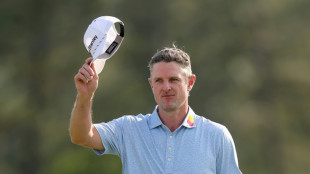 Rose again enjoys 'luxury' of first-round Masters lead
Rose again enjoys 'luxury' of first-round Masters lead
-
Rose rockets to Masters lead, defending champ Scheffler in pursuit

-
 Tesla opens first showroom in oil-rich Saudi
Tesla opens first showroom in oil-rich Saudi
-
Oscars to add new award for stunts

-
 Hatton loves being at Masters but 'It's just so hard'
Hatton loves being at Masters but 'It's just so hard'
-
'Mistakes can happen': Amorim backs Onana after Lyon nightmare

-
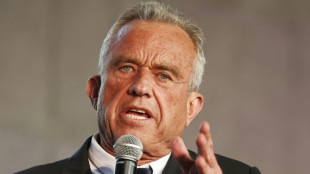 RFK Jr says study will reveal cause of autism 'epidemic'
RFK Jr says study will reveal cause of autism 'epidemic'
-
Tourist family, pilot killed in 'tragic' NY helicopter crash
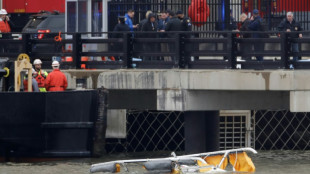
-
 No.1 Scheffler makes strong Masters start to defend title
No.1 Scheffler makes strong Masters start to defend title
-
Man Utd and Spurs draw in Europa League, Rangers hold Athletic

-
 Rose rockets to Masters lead with Scheffler and McIlroy in pursuit
Rose rockets to Masters lead with Scheffler and McIlroy in pursuit
-
Man Utd held late in Lyon after Onana errors in Europa League

-
 Man Utd held late in Lyon after Onana errors
Man Utd held late in Lyon after Onana errors
-
Wall Street rally fizzles as tariff fears resurface
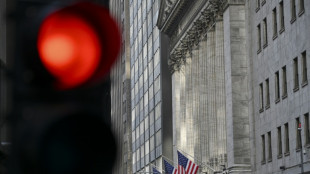
-
 MLS to open 'second phase' of major season overhaul study
MLS to open 'second phase' of major season overhaul study
-
Argentina braves 24-hour strike as it awaits word on IMF loan

-
 Spain's Ballester finds relief in Masters water hazard
Spain's Ballester finds relief in Masters water hazard
-
Porro rescues Postecoglou as Spurs held by Frankfurt

-
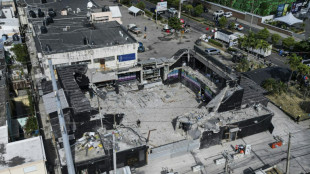 Grieving Dominicans start burying 200+ victims of nightclub disaster
Grieving Dominicans start burying 200+ victims of nightclub disaster
-
CONMEBOL proposes one-off 64-team World Cup in 2030

-
 Rybakina on form for Kazakhstan in BJK Cup
Rybakina on form for Kazakhstan in BJK Cup
-
Former Real Madrid coach Leo Beenhakker dies aged 82

-
 Rose rockets to top of Masters leaderboard, Scheffler one back
Rose rockets to top of Masters leaderboard, Scheffler one back
-
Langer fades after fiery start in Masters farewell

-
 Iran, US raise stakes ahead of key talks in Oman
Iran, US raise stakes ahead of key talks in Oman
-
US-China confrontation overshadows Trump's 'beautiful' trade war

-
 RFK, MLK assassination files to be released in 'next few days'
RFK, MLK assassination files to be released in 'next few days'
-
Relevent settle anti-trust lawsuit with US Soccer

-
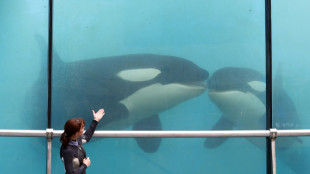 Orcas, dolphins stuck in closed French marine park
Orcas, dolphins stuck in closed French marine park
-
Rahul shines as Delhi bag fourth straight win in IPL

-
 Family bid farewell to merengue singer, killed in Dominican nightclub disaster
Family bid farewell to merengue singer, killed in Dominican nightclub disaster
-
Mbappe ups stakes in bid to recoup 55mn euros from PSG

-
 Scheffler grabs share of early lead in quest for Masters repeat
Scheffler grabs share of early lead in quest for Masters repeat
-
Why did a Dominican nightclub roof cave in?
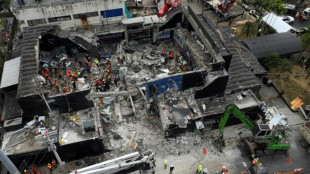

Plastic garbage covers Central American rivers, lakes and beaches
A blanket of multi-colored plastic waste flowing in from tributaries covers Lake Suchitlan in El Salvador.
It is a sorry scene that has also become an all too common sight on the Caribbean beaches of Honduras, where thousands of tons of rubbish arrive from neighboring Guatemala.
Fizzy drink bottles, medication packets, tattered flipflops: all sorts of plastic rubbish can be found floating on 13,500-hectare (52 square mile) Lake Suchitlan, which serves as a reservoir for a power plant and is considered by UNESCO to be a wetland of international importance.
Local fishermen say the pollution forces tilapia and cichlid fish deeper into the artificial lake -- the largest body of freshwater in the country -- where they cannot be reached with fishing nets.
"It has been more than two months since we've been able to fish," angler Luis Penate, 25, told AFP.
To make ends meet he has started ferrying around tourists in a boat owned by another fisherman.
Ducks clear paths through the rubbish, little tortoises climb on top of floating bottles to sunbathe and skinny horses wade into the lake to drink the contaminated water.
This contamination is unprecedented, says Jacinto Tobar, the mayor of Potonico, a small village 100 kilometers north of San Salvador in Chalatenango department.
"The fauna and flora are suffering a lot" and there are ever fewer tourists, he said.
The fishermen must also compete with 1.5 million black cormorants that inhabit the lake, according to Tobar, who says they have become a type of plague since arriving as migratory birds and then staying put.
With a population of 2,500, Potonico is the most affected of 15 riverside villages.
The state body that administers the reservoir employs dozens of workers to clean the lake by hand.
Some locals also help out with the task, which Tobar says will take three to four months to complete.
"What can we hope for in the future if we don't look after our environment, if we soil our streets, rivers, lakes, forests and beaches," said President Nayib Bukele earlier this week at the launch of a "Zero Rubbish" campaign.
Environment minister Fernando Lopez said the country generates 4,200 tons of waste a day, of which 1,200 tons end up in rivers, beaches and streets.
- 'Unable to stop it' -
One of the worst affected areas of the Central American Caribbean coast is the beaches of the Omoa region in Honduras.
It is a beautiful coastline with abundant vegetation and palm trees, some 200 kilometers (120 miles) north of Tegucigalpa.
But in some places the sand is almost entirely covered with plastic waste of all sorts, including syringes.
"This rubbish comes from the Motagua river on the Guatemalan side, they weren't able to stop it," said Candido Flores, 76, a local resident.
"As the river rises, it returns again."
It has created islands of floating waste that have been denounced by local authorities and activists, and has even caused tensions between the two countries.
Every year, some 20,000 tons of plastic waste comes through the Las Vacas river, a tributary of the Motagua, according to The Ocean Cleanup, a Dutch NGO.
Most of that comes from a landfill in the Guatemalan capital.
Environmental activists say the problem must be tackled at its source.
"We must attack where the main flow of rubbish comes from," said Eduardo Arguera, 29, an architecture student at the University of El Salvador, who has launched several clean up campaigns.
To contain plastic waste and prevent it from reaching rivers and lakes, he suggests fencing it in at strategic points.
Ricardo Navarro, president of the Center of Appropriate Technology, says only 30 percent of the waste floats; the rest sinks to the bottom of the bodies of water.
Meaning what is visible, quite literally, is just the tip of the iceberg.
The United Nations Environment Programme says 11 million metric tons of plastic enters the world's oceans every year, and warns that number could triple in the next 20 years.
G.Stevens--AMWN

